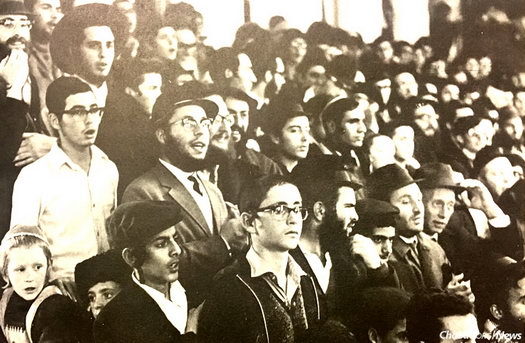
Weekly Dvar Torah: Love and Selflessness to the Core
As we transition from the month of Av, in which we mourn the destruction of the Temples and reflect on our long and bitter exile, it is crucial to understand the teachings of our sages. This exile, which has lasted nearly 2000 years, is attributed to Sinas Chinom (baseless hatred). Our sages assert that the remedy for this exile is to increase Ahavas Chinom—pure, selfless love. With the month of Elul approaching and the High Holidays on the horizon, it is fitting to explore Ahavas Yisroel and its central role in our life. This concept is fundamental to everything we hold dear: starting with evoking heavenly mercy for the New Year, the future redemption, the essence of Chassidus, and the relationship between Rebbe and Chossid, as well as between Chassidim themselves.
The Hayom Yom, a collection of Chassidic teachings, includes about 15 entries on Ahavas Yisroel. A notable entry is from 24 Menachem Av, which recounts a tradition passed down from Rebbe to Rebbe. During the well-known dispute between Chassidim and Misnagdim, the Alter Rebbe’s Chassidim expressed their suffering from the Misnagdim’s ‘Proste’ (coarse) simple folk. The Alter Rebbe responded by referencing the Baal Shem Tov’s great love for ‘Proste’ Jews. He quoted one of the first teachings that he heard from the Maggid of Mezritch, who said in the name of the Baal Shem Tov; “To love a fellow Jew is to love G-d. [As it is written,] You are children of G-d your Lord. One who loves the Father, loves [His] children.”
This teaching underscores the importance of Ahavas Yisroel as a core principle passed down through generations of Rebbes. It highlights the core essence of being a Chossid, and the intrinsic connection between a Chossid and his Rebbe, showing how central this love is to Chassidus and the Rebbe-Chossid relationship.
Here is the background of this Hayom Yom entry:
In the mid-1930s, amidst rising anti-Semitism in Europe, many assimilated Jews began seeking a return to their roots. Jewish leaders approached the Frierdiker Rebbe in Poland for guidance on how to assist these returnees. The Rebbe advised that the most effective method is through love. He shared a story passed down from his father, the Rebbe Rashab, who had heard from his father, the Rebbe Maharash, who in turn had learned from his father, the Tzemach Tzedek, who together with the Miteler Rebbe heard from the Alter Rebbe a message that he heard from the Maggid in the name of the Baal Shem Tov. Naming every Rebbe by name. This chain of teachings highlights that the Alter Rebbe’s response to the suffering of his Chassidim was grounded in the Baal Shem Tov’s principle of loving even the coarse Jews who were persecuting Chassidim.
Several Hayom Yom entries elaborate on Ahavas Yisroel:
6 Adar 1: The Rebbe Rashab described the profound satisfaction that comes from doing a favor for another Jew, noting that this joy surpasses even the highest spiritual achievements. He emphasized that a person can find many reasons to endure difficulties themselves but cannot fathom such assumptions about others.
2 Tammuz: This entry explains that we start our prayers by accepting the mitzvah of loving a fellow Jew. This love serves as a gateway for G-d to accept our prayers, as G-d values our love for His children.
18 Av: The Frierdiker Rebbe highlighted that love for a fellow Jew should reach the core of one’s soul, even towards those who may cause us harm. This level of love is epitomized by the story of Reb Hillel Paritcher, who cried over the suffering inflicted by the Misnagdim, but emphasized that love must be unwavering, even for those who may cause us harm, because the Miteler Rebbe taught, that Ahavas Yisroel must permeate to the point of exhaustion of the soul.
A poignant example of Ahavas Yisroel is shared by a Russian friend who emigrated to Israel in the early 70s. This friend had a neighbor an elderly Chossid who had spent seven years in a Soviet Gulag due to an informant’s betrayal. Years later, upon meeting the informant in Israel, he chose to host him for three weeks. When questioned about hosting someone who had betrayed him, he explained that he could not judge a fellow Jew who had been persecuted by the Soviets and who did not act out of malicious intent. This story exemplifies loving a fellow Jew to the core of one’s soul.
These teachings and examples converge on a central theme: there is nothing more crucial than loving a fellow Jew. This principle is fundamental to being a Chossid and to Chassidus. Our Rebbes have imparted this message, embedding it deeply within our beliefs and actions. This explains Lubavitch’s success in sending Shluchim to every corner of the world, under the most extreme conditions, being there for any and every Jew in need of spiritual or material assistance. This exemplifies this selfless love.
As we enter the month of Elul, we embrace Ahavas Yisroel wholeheartedly. By replacing baseless hatred with selfless love, we invoke G-d’s mercy, leading to a sweet New Year and the ultimate redemption with Moshiach.
Have a Shabbos of love and Selflessness,
Gut Shabbos
Rabbi Yosef Katzman











